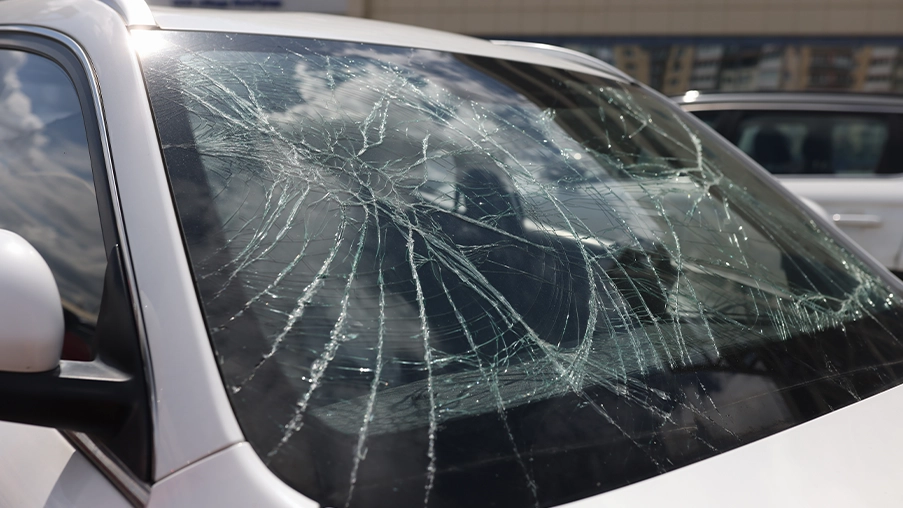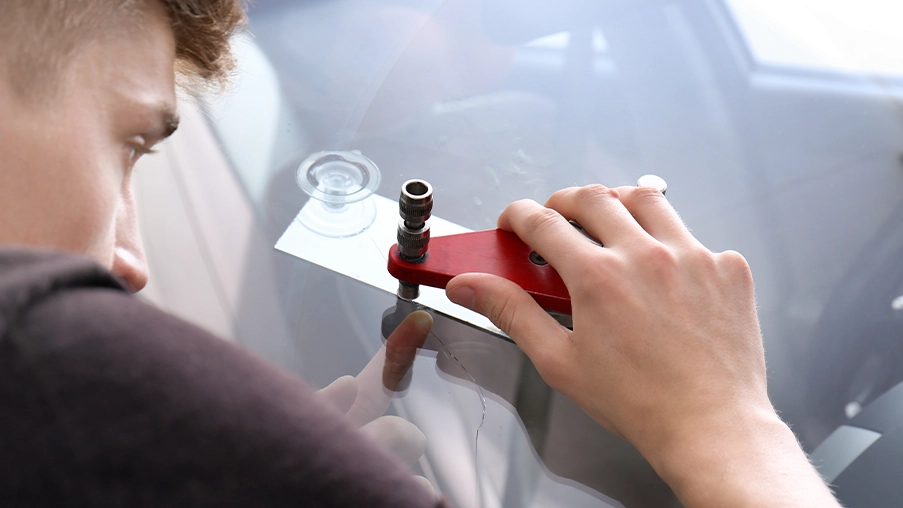How to Fix Common Windshield Problems & Avoid Costly Repairs
March 23, 2025
A cracked windshield undermines visibility and reduces your car’s structural integrity, making you more likely to get into an accident. Knowing windshield issues and solutions helps drivers prevent minor problems from turning into expensive repairs.
Every windshield problem must be dealt with quickly, whether it is a small chip, a deep crack, or a seal failure. Neglecting minor damages may cause you to replace the windshield instead of repairing it. Other external factors, such as incorrect wiper use, extreme temperatures, poor maintenance, etc., also affect the age of your windshield.
This blog covers some common windshield issues, how to resolve them, and how to prevent them from becoming permanent. Read on!
Common Windshield Problems and Their Solutions
A damaged windshield can compromise visibility and safety. Knowing about common windshield problems and their solutions can help prevent costly repairs.
Windshield Chips
Small chips in the windshield are caused by debris hitting the glass at high speed. Though they might seem small, chips can turn into bigger cracks if you leave them. If the chip is smaller than a quarter, a professional resin injection can be used to restore strength, and the windshield should be repaired.
If the damage penetrates through the outer layer of glass, you might need mobile auto glass repair and replacement services. Chips should be fixed promptly to prevent structural weakening and maintain visibility.
Windshield Cracks
Temperature changes, stress, or direct impact cause cracks. There are tiny hairline cracks, and some are structural cracks that require windshield replacement. Cracks are generally caused by fluctuations in road vibration and weather changes, which can also spread minor cracks.
Special resin could be used to treat a crack that is less than a quarter of an inch in size. However, to maintain the integrity and safety of the vehicle, larger cracks or many cracks that impair the driver’s vision typically call for a complete windscreen replacement.
Scratches and Surface Damage
Windshield scratches typically happen due to mishandling the wipers, dirt buildup, or exposure to an abrasive material. Minor scratches are not an issue, but deeper scratches can skew your view in the daylight or at night.
Windshield professionals apply a polishing compound to fix minor scratches. Any major scratches require auto glass repair and replacement to lower risk and maintain safe driving conditions.
Windshield Wiper Streaks and Smudges
Wiper streaks and smudges occur due to worn-out wiper blades, debris collection, or incorrect wiper fluid usage. This problem impairs visibility, particularly during rainy or foggy weather.
The simplest solution is replacing worn-out wiper blades every six to twelve months and regularly cleaning the windshield. Streaking can also be prevented by using high-quality wiper fluid. If residual dirt persists after completing the preceding steps, intensive cleaning may be required to remove the embedded grime and restore visibility.
Water Leaks and Seal Failures
Water seepage around the windshield is usually the result of seals that are either bad, improperly installed, or well past their shelf life.
Signs that seepage is in progress include condensation, a musty smell, or water pooling inside the car after a rain. Windshield professionals can fix small leaks with specific sealants. However, serious seal failures require complete windshield sealing for a proper fit.
Fixing sealing issues is crucial to avoid consequential interior damage, electrical damage, and Mold formation.
Windshield Fogging and Condensation
Fogging and condensation inside the windshield result from differences in temperatures between the air being circulated inside the vehicle and the air outside. This common problem occurs in humid or cold conditions, restricting visibility. To avoid fogging, use the defroster with appropriate ventilation to maintain proper air circulation.
The use of an anti-fog solution will also help reduce moisture buildup. If the condensation continues to form, it can signal a windshield repair, or it can be an indicator of seal damage. Addressing the ventilation problems and making sure that the seals of the windshields are good will improve visibility while thus minimizing moisture retention.
Preventive Maintenance Tips for a Healthy Windshield
Proper windshield maintenance will prevent standard windshield problems and solutions from becoming expensive repairs.
These preventive measures will help in keeping your windshield durable and clear:
- To protect auto glass from changes in temperature that could weaken it, park in shaded areas.
- Regular windshield washing with a mild cleanser and a microfiber cloth will avoid scratches and dirt accumulation.
- Always check the wipers. Replace them if they leave streaks or smudges, as old wipers can damage the glass.
- A specialist should immediately repair minor chips to prevent them from spreading.
Frequent checkups on seals can help to reduce the leaks cause by seal failures.
Avoid sudden temperature changes, such as blasting air conditioning onto a hot windshield. - For deeper cracks, seek expert mobile auto glass repair & replacement for safety and durability.
Conclusion
Proper windshield maintenance entails having a clear view while driving and structural integrity.
In this regard, regular inspections, fast windshield repairs, and skilled mobile auto glass repair and replacement services are required to ensure longevity and performance. If your windshield has chips, cracks, or seal failures, performing preventative maintenance will help extend its life and improve driving safety.
Don’t wait until a minor problem turns into a significant hazard—trust NuVision Auto Glass for excellent windshield repair and replacement. Whether you need a quick fix for a little scratch or a complete windshield replacement, our team provides fast, dependable, and insurance-approved service with minimal inconvenience.
Connect with our team for more info!
FAQs
1. What type of windshield damage is covered by insurance?
Comprehensive insurance frequently covers windshield and side window repair and replacement, particularly damage caused by non-collision incidents such as road debris, weather, or vandalism.
2. What are the defects of a windshield?
Cracks, chips, scratches, wiper streaks, water leaks, and seal failures are all common flaws that can have an impact on visibility and safety.
3. Can you fix a cracked windshield without replacing it?
Minor cracks of less than a quarter can be fixed with professional resin injections, while bigger cracks sometimes necessitate windshield replacement.
4. How much does it cost to replace a windshield without insurance?
Replacement costs vary by car make, model, and glass type, but commonly range from $200 to $500 or more.




